A Guide to Custom Software, Part 1: Custom Software vs. Off-The-Shelf Software
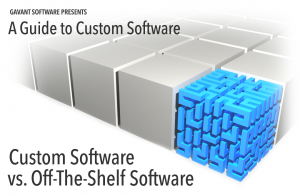 This series, A Guide to Custom Software, was developed to provide insight to give you an edge when making decisions about software. First up in the series: Custom Software vs. Off-The-Shelf Software.
This series, A Guide to Custom Software, was developed to provide insight to give you an edge when making decisions about software. First up in the series: Custom Software vs. Off-The-Shelf Software.
Managers in today’s companies are keenly aware that software is vital to ensuring smooth operations and competitive success. The software that handles business operations typically falls into two general categories: custom software and off-the-shelf software.
There is a fundamental difference between the two. Custom software is written and tailored for the specific needs of a single business or family of businesses. Off-the-shelf software (also called boxed, canned, or packaged software) is ready-made and often specialized for a defined industry vertical. There are myriad packages that claim to provide all the capabilities a business needs, appealing to a broader audience.
The purpose of this article, then, is to provide consumers of business software with some insight into conditions that may steer a decision on software toward one alternative or the other. Our goal is to help you evaluate which option will best be a fit for your business.
Choose a custom software solution if…
 …you have requirements that are unique to your business. Because boxed software is designed for a broad audience, it cannot realistically meet all of the specific needs of every business. Its functionality may not lineup with your unique environment, potentially draining your business of efficiency or imposing undue costs and overhead on your workflow. Custom software addresses this challenge, as it’s tailored to meet your particular functional objectives.
…you have requirements that are unique to your business. Because boxed software is designed for a broad audience, it cannot realistically meet all of the specific needs of every business. Its functionality may not lineup with your unique environment, potentially draining your business of efficiency or imposing undue costs and overhead on your workflow. Custom software addresses this challenge, as it’s tailored to meet your particular functional objectives.
…you require flexibility. Ready-made software can be very rigid in how it overlays business operations. There are a set number of features that can be toggled on and off, leaving you with more features than you’ll ever truly use or not nearly enough to fulfill your fundamental needs. As demand, customer characteristics, and competitors change, the software may or may not adapt. Custom software can be readily extended and modified in a dynamic landscape.
…you require specialized integration. Integration is the key to speed in corporate information systems. Not only do the in-house systems need to adequately talk to each other, but we’re often tasked with connecting to customer or supplier systems to enable favored trade partner status. Commercial off-the-shelf software may not envision the need for such interconnection, or even be compatible with those other systems you have in place or are looking to add. This scenario adds complexity and overhead, ultimately requiring more work.
…you have legacy software that you can’t live without. Old, out-of-date software is often kept around because its processes are essential to business functions. As time goes by, attempts at modernizing infrastructure are made more complicated by legacy systems that can’t be eliminated. Custom software can keep this integral, core functionality intact while applying a modernized facelift or a means to communicate with other modern systems.
Opt for an off-the-shelf solution if you have…
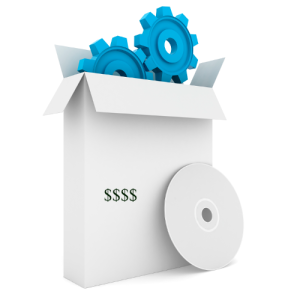 …a modest budget. There are off-the-shelf software systems that appeal to every budget. Not all are inexpensive – some can range in cost from a few thousand to millions of dollars. However, a wide variety of ready-made software products do provide great value on a small budget, with a primary benefit coming in the form of reduced upfront costs.
…a modest budget. There are off-the-shelf software systems that appeal to every budget. Not all are inexpensive – some can range in cost from a few thousand to millions of dollars. However, a wide variety of ready-made software products do provide great value on a small budget, with a primary benefit coming in the form of reduced upfront costs.
…little competitive advantage supported by software. If your competitive advantage lies outside of the realm of the software, then nearly any canned software would suffice. There’s no need to overthink investing in software for processes that provide little or no strategic benefit.
…a “yesterday” timeline. Off-the-shelf software can often allow near-immediate deployment and use. While some functionality may be sacrificed by going with an instant fix, such packaged offerings can get you up and running right away while affording some time to determine a proper long-term solution that aligns with your anticipated requirements.
…a sufficient pre-existing canned solution. Boxed software often is highly valuable and can get most or all of your needs covered. If there is packaged software already available that sufficiently meets your functionality specifications, there is little reason to spend time and money reinventing the wheel with a custom solution. Keep this simple.
Whether your environment leads you to select a custom software developer or you opt to utilize a commercial off-the-shelf software system, your decisions will have enduring ramifications for your business. Knowing when to choose a custom software solution versus an off-the-shelf product can help avoid a costly software do-over.

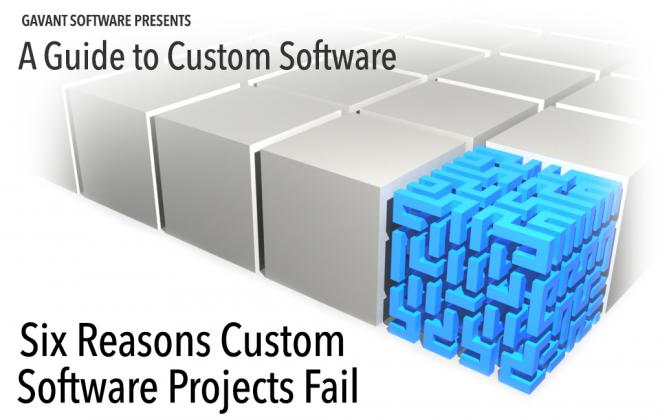
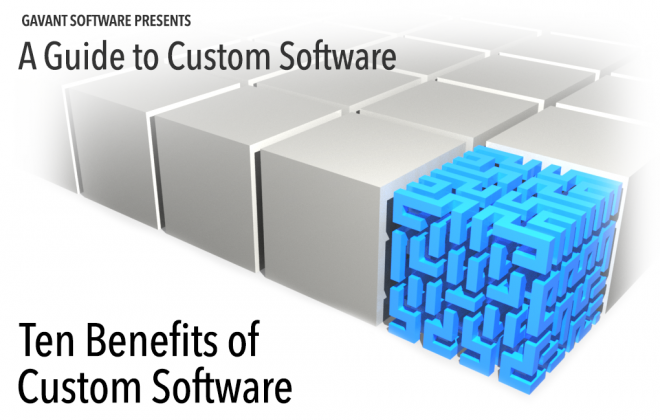

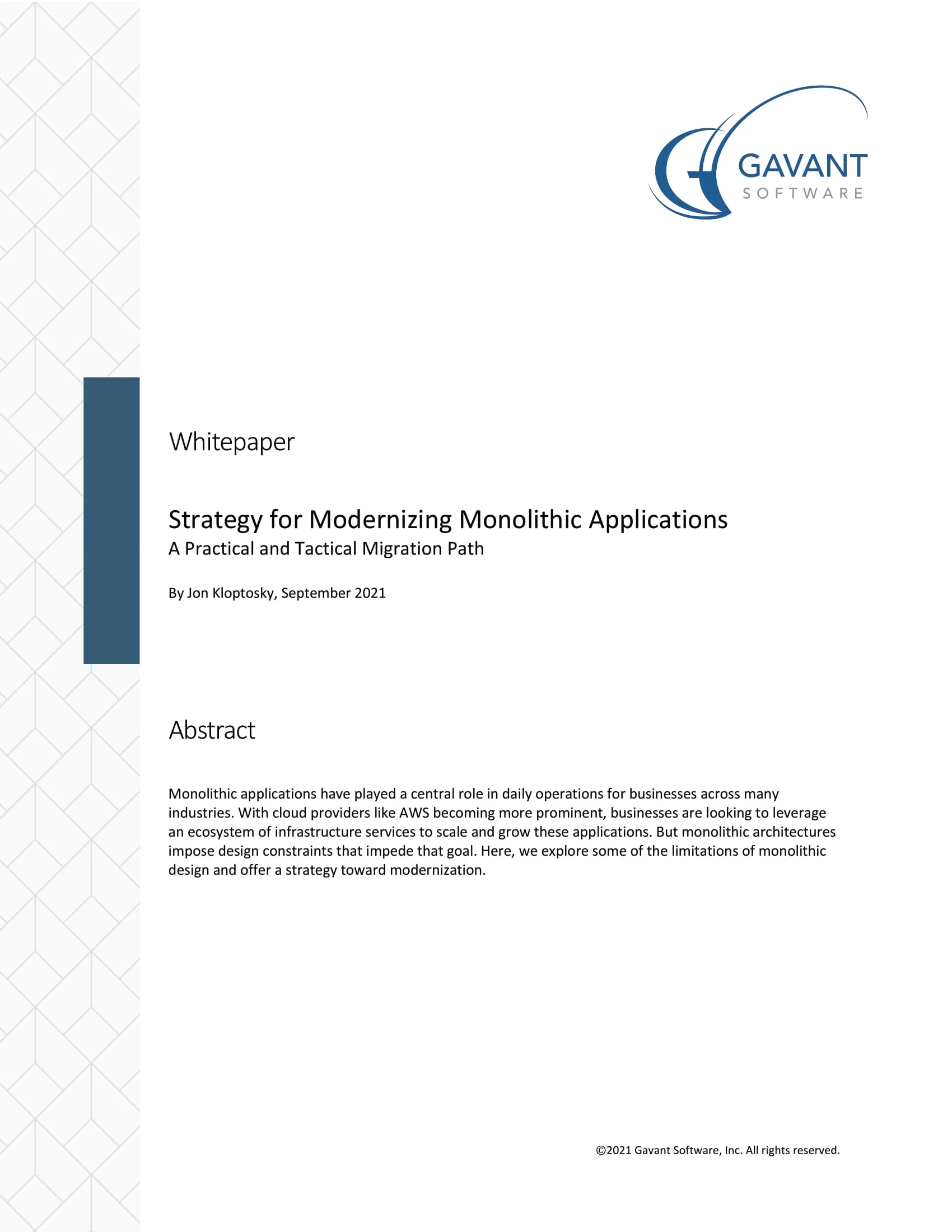 Strategy for Modernizing Monolithic Applications
Strategy for Modernizing Monolithic Applications
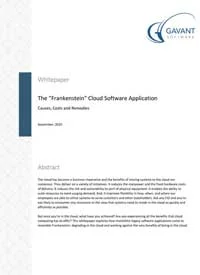 The "Frankenstein" Cloud Software Application
The "Frankenstein" Cloud Software Application
 A Guide to Custom Software Development
A Guide to Custom Software Development